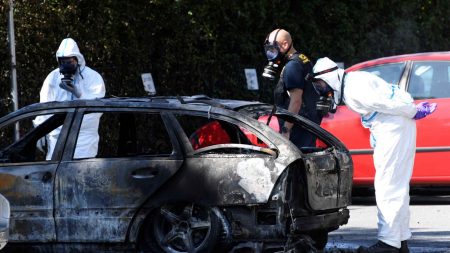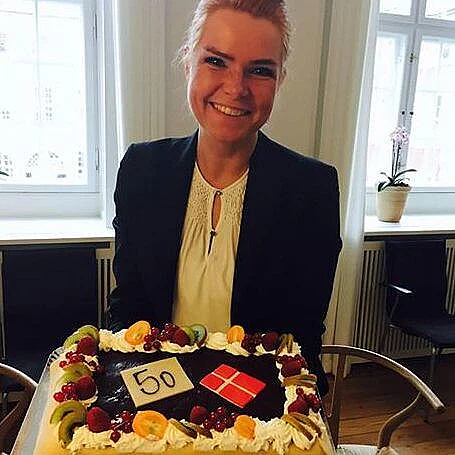This website uses cookies to improve your experience. We'll assume you're ok with this, but you can opt-out if you wish. Read more
The stench of election (continued)
The stench of election (continued)
Last week I wrote about the Social Democratic administration’s plan to allow minors to change their legal gender in the context of various proposals in the run-up to the parliamentary elections. Of course that isn’t the main item on the party’s platform and election strategy. A few days after the announcement, Prime Minister Mette Frederiksen unveiled a proposal of measures to reduce crime, gang crime in particular (DK). The plan, entitled “Safe localities without criminal gangs” and known as “the fourth gang package,” consists of no less than 30 initiatives.

This car’s not returning to Sweden. Photo: TT News Agency © Scanpix
One of the distinctive features also concerns minors; it makes recruiting youths into gangs a separate punishable offense. “When we look at the figures,” says Justice Minister Matias Tesfaye, “we can see that many gang members have an older brother who is also a gangster. . . . We need to break the food chain in organized crime.” The number of gang members has been rising since 2018.
The package will strengthen initiatives in the earlier gang packages such as increased sentences for violent crime related to gang activity and for shootings in public spaces as well as measures enabling the police to ban gang members from specific municipalities. It includes increased staffing to crack down on gangs’ financial crimes—money laundering, strawman businesses, and tax fraud—and to expand prison capacity.
Less shooting practice and criminal tourism
Another notable measure is tighter control of shooting ranges, where gang members have exploited opportunities to learn how to shoot and handle weapons. Denmark already has strict gun licensing rules, but from now on, people who have not yet been approved by the police will be allowed fewer trial visits to shooting ranges and will be registered electronically. The maximum penalty for possession of an arsenal will also be doubled to 16 years.
The administration also wants to be able to deport foreign nationals (DK) who receive an unconditional sentence. At present, foreign criminals can avoid deportation if they have resided in Denmark for several years. Frederiksen and Tesfaye note that immigrants from non-Western countries and their descendants are overrepresented in crime statistics. “Unfortunately, the truth is that immigration policy is closely linked to crime (DK),” said Frederiksen, “and there is too large a group that is not part of Denmark.”
Beware Swedish hospitality
Violent crime has fallen slightly over the past decade and has not been a prominent issue in Denmark this year. It has been some time since Copenhagen has seen a wave of gang-war shootings of the sort that has plagued Sweden in recent years. The latter country, which took in 163,000 refugees in 2015, has just matched the record number of annual shooting deaths (DK) with four months left to go in the year. Some of the gang activity in neighboring Malmö has spilled over the Øresund Strait Bridge into Denmark.
“There are large parts of Greater Copenhagen where I myself would never dare to go today,” said Frederiksen, without specifying the areas. Copenhagen Mayor Sophie Hæstorp Andersen, also a Social Democrat, demurred: “Personally, I feel completely safe walking around Copenhagen.” According to recent surveys, 9 percent of Copenhageners feel unsafe in their neighborhoods (DK) during daytime hours. In the evening and at locations such as train stations, the figure is twice as high.
Resocialization can wait
Two of the administration’s supporting parties, the Social Liberals and the Socialist People’s Party, praised the administration’s plan, with the sensible proviso that there should also be measures to resocialize gang members in prisons. Linda Kjær Minke, a sociologist at the University of Southern Denmark’s Institute of Law, was somewhat puzzled by the proposal because she notes that longer sentences alone have not been shown to have a preventative effect. Others note that the majority of gang members registered by the police are not immigrant groups but rather bikers (known in Danish as rockers), who tend to be white “ethnic Danes.”
Britt Bager of the Conservative Party, who also favors the package, is less in doubt about the plan’s motives, adding that her own party had made similar proposals two years ago: “It’s a little comical. . . . I think it stinks of a parliamentary election.” Some observers believe that the Social Democrats could lose votes (DK) to the new party founded by the anti-immigration crusader Inger Støjberg, and Frederiksen’s targeting of people who are “not part of Denmark” may be an effort to stop defections. Støjberg is even running for Parliament in Frederiksen’s district (the seats are awarded to the parties, so they’re not running directly against each other).
Støjberg’s party’s name, Danmarksdemokraterne (“Denmark’s Democrats”), echoes Sverigedemokraterna (“Sweden Democrats”), the right-wing nationalist movement whose adherents had earlier been treated as pariahs but that is now gaining popularity. In her time as Integration Minister, Støjberg racked up more than 100 restrictions on immigration, the first 50 of which she famously celebrated with a cake. Mette’s 30 new ones will probably meet even Inger’s approval and gain broad support, although the Social Democrats’ far-left supporters will grumble about a lack of preventative and remedial measures. The problem for the party after four years in office is that, despite her good works, people are getting tired of Mette and her simultaneously ruthless and moralizing executive style.
But with 40 percent of Americans expecting civil war, it’s encouraging to see a well-functioning democracy in action.

Støjberg closing the border. Photo: Facebook.


